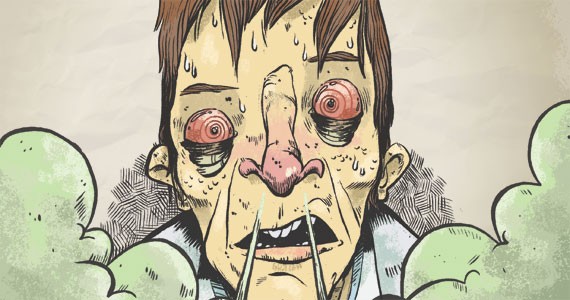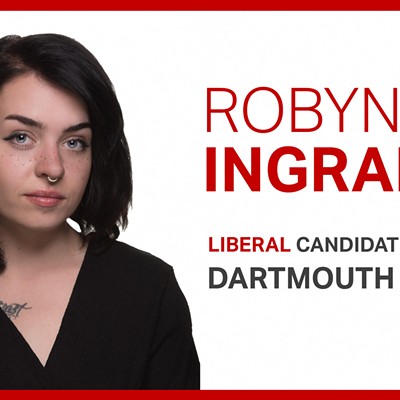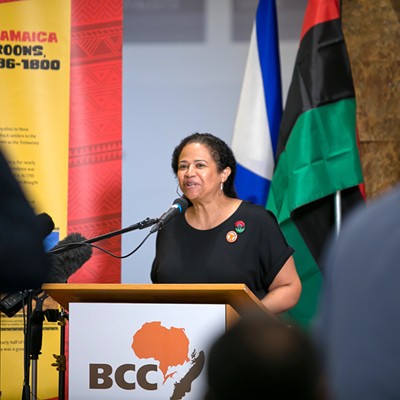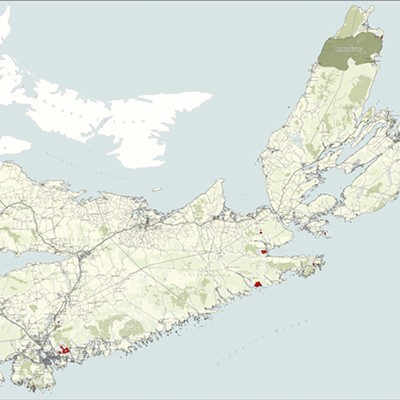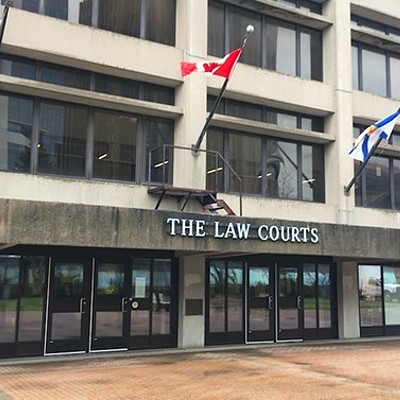November 6, 2012 was a momentous day for marijuana in North America. That's when citizens in Washington state and Colorado voted in favour of ballot initiatives that decriminalize the possession of marijuana by adults. Washington's Initiative 502 regulates the sale of marijuana through the state's liquor control board, and extends drunk driving laws to cover driving while high. Oregon's Proposition 64 goes even further, allowing adults to own up to six plants, and for businesses to sell marijuana.
The same day, however, Canadian marijuana laws became much stricter, as provisions of the Safe Streets and Communities Act came into effect. That act imposes tough new mandatory minimum prison sentences of two years for anyone convicted of possessing more than six marijuana plants.
And in Nova Scotia, the War on Marijuana continues with Nancy Reagan-like gusto. Police agencies regularly announce pot busts. For example, on November 2, four days before the Washington and Colorado decriminalization votes, the RCMP busted a grow-op in Seaforth. The next week, they arrested a 36-year-old man in Cole Harbour for having 34 plants.
The biggest pot bust in years, perhaps ever in Nova Scotia, came just a few weeks later on December 14, when the RCMP led a series of early morning raids in and around Halifax and arrested 28 people for growing and selling marijuana. That bust was remarkable for the large number of people arrested, but also because many of the arrestees could be described as pillars of the community: a doctor, an elementary school principal, an Olympic athlete, a successful restaurateur. They range in age from 23 to 67 years old, and live scattered across the community, in Dartmouth, Cole Harbour, Hammonds Plains, Porters Lake, Enfield, East Preston, Waverley, Porters Lake, Lawrencetown. They are, in a word, us.
The stark contrast between US and Canada marijuana policies would startle an observer transported to the present from the turn of the millennium, when the exact reverse scenario held: With the US instituting mandatory minimum prison sentences for growing pot, Canada was dabbling with legalizing it. In 2001, Health Canada began issuing its first medical marijuana permits, and in 2002 the Canadian Senate's Special Committee on Illegal Drugs issued a 600-page report calling for the legalization of pot. Back then it was clear Canada was on the road to decriminalization, while the US would double down on prohibition.
So what happened? In the States, citizen activists and health professionals worked to make older medical marijuana policies usable, and the state of California passed its Senate Bill 420 in 2003, soon to be followed by other states. Given the lack of a centralized health care system, 50 different state systems and the ease of cultivation on the US west coast, medical marijuana was the toe in the door that led to the current wave of full decriminalization.
In Canada, well...Stephen Harper happened. The Conservatives were first elected to a minority government in 2006, and then a majority in 2008. As they've consolidated power they've brought forward ever-more draconian drug policies, making it extremely difficult for people to grow their own pot for medical purposes, and now possession of just six marijuana plants receives twice the jail time than does luring a child to watch porn or exposing oneself to children on a playground
Canada could follow the new US model of decriminalization, but it certainly doesn't have to. Canada could go on, destroying lives and families, forever. It's a rich country, and can afford to lock otherwise potentially productive pot smokers in prison for decades, even at the cost of civil liberties and the collective sense of decency.
It's currently impolitic in Nova Scotia to discuss the costs of marijuana prohibition, but lots and lots of people on Canada's west coast state it plainly.
"I think decriminalization in the US will only make the situation worse here," in Vancouver, says Dan Werb, an academic and co-author of a recent report published by Stop the Violence BC that calls for the decriminalization of marijuana in British Columbia. "As the criminal gangs lose their markets in the United States, they'll look to expand into the domestic market. We'll see more violence as these gangs compete for market share."
Stop the Violence's call for decriminalization is endorsed by police chiefs, prosecutors, academics and health professionals, among others, all who say the social and monetary costs of prohibition far exceed any benefit prohibition has brought. "If we regulated cannabis like tobacco, fewer children would use it, and use would go down over time," says Werb.
Marijuana as a drug is simply the hemp or cannabis plant (the names are interchangeable) bred for high THC levels. Werb, like most legalization advocates, uses "cannabis" to describe the plant.
In the United States, marijuana laws are mostly state laws, so reversing prohibition could happen at a local level. When citizens demanded change in states like California, they successfully ushered in a new era of medical marijuana. When citizens demanded change in Washington and Colorado, they got the beginning of what will certainly be a new era decriminalization. These are toe-in-the-door states, or if you will, "gateway states," to give a rational twist to the absurd anti-marijuana notion that pot is a "gateway drug."
In Canada, however, marijuana laws are federal, and are therefore currently written by the prohibitionist Conservative Party. Werb acknowledges that complication, but still thinks decriminalization in British Columbia is achievable. He says ultimately drug use should be seen as a health issue, and should therefore fall under the purview of the provinces, which set health policies. Certainly, the broad coalition of groups behind Stop the Violence is an example of formidable citizen action, of the kind that got changes rolling in US states. Think of British Columbia as Canada's gateway province.
In practical terms, Werb says the move to legalization of cannabis could come through new provincial health regulations. Failing that, there could be an exemption to federal marijuana laws granted in a parallel fashion to the exemption that allows InSite---Vancouver's supervised heroin injection site---to operate. Although having made that comparison, Werb is quick to kill any notion that legalizing marijuana will lead to the legalization of all drugs. "Each drug must be understood to have its own set of issues, its own level of harm," he says. "We have to tailor policy to fit each, differently."
And, says Werb, if the provincial health authorities wouldn't institute the appropriate marijuana regulations, and if the federal government doesn't grant an exemption to BC, there's still a way to force de facto decriminalization of pot: The mayor of Vancouver "could tell the police department to stop enforcing cannabis laws. The mayor's in charge of the organization that oversees the police department, so he has that power."
That kind of use of political power wielded to make sure the wishes of the people are enacted may be possible in Vancouver, but it Halifax, at least at present, there is zero political will to set any policy for the police department. In Halifax, the Board of Police Commissioners acts as a cheerleading squad, praising and unquestioningly accepting any and all initiatives that come from the department brass.
And local police are hell-bent on continued enforcement of pot laws, as December's big bust demonstrates. With each arrest, a press release is sent out reading that "wherever illegal marihuana [sic] grow operations exist, there's an increase in criminal activity and an associated increase in violence." Even though the idea that crime grows wherever weed grows is as outdated as the legal code's spelling of marijuana. As Werb says, "it's not the cannabis trade that causes the crime, it's the prohibition."
If BC is the gateway province in terms of breaking pot prohibition, Nova Scotia is the holdout. As it resisted Sunday shopping, it resists Sunday sparking.
But maybe last year's bit pot bust in Halifax is a game-changer. Werb, immersed in the legal issues surrounding BC's pot culture, is surprised to hear about the extent of the December bust of 28 people. "That'd be big here in BC," he says.
It's not known exactly how expensive the December bust was, how many police officers were diverted from doing real police work and how much it cost to investigate and charge productive citizens, and then drag them through the legal system. The search warrants used to justify the December raids have not been released, and detailed allegations have not yet been filed with the court. The RCMP describes the bust as "an 11-month investigation" involving "a team of approximately 120 police officers" with big-ticket scores including "approximately $250 thousand worth of marihuana production equipment, and over $100 thousand in cash."
But at the same time the RCMP refuses to give a price tag for nearly a year worth of work by dozens of officers, doubtless because were the full costs revealed, people might object.
For its part, the Nova Scotia department of justice explains its stance on marijuana in a boilerplate email statement: "Marihuana [sic] law is under the jurisdiction of the federal government. The Province of Nova Scotia respects the Government of Canada's authority and position on this issue. Changing the law would require a national discussion however Nova Scotia has no intention of initiating that at this time."
"No intention" of change. As far as Nova Scotia's NDP government is concerned, lives and families will be destroyed, forever. Communities will be disrupted, forever.
But undoubtedly, change will come. One day, hide-bound Nova Scotia will be pulled, yelling and screaming, into decriminalizing pot. Maybe the large pot bust of December will be the catalyst for motivating more citizen action. Maybe Nova Scotians will see their neighbours, their doctors, their school principals, their friends and family, fellow Nova Scotians that look just like us, and say "enough is enough."
Maybe.
Tim Bousquet is news editor at The Coast. In the past 20 years he has smoked pot maybe five times, and isn't particularly interested in smoking any more in the future.

